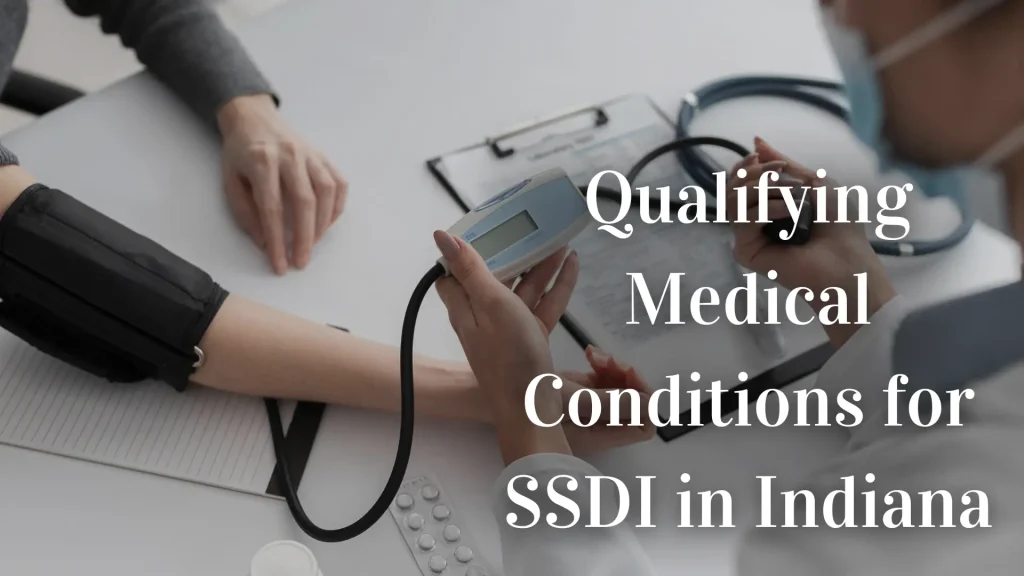
Social Security Disability Insurance, or SSDI, provides long-term financial support to Indiana residents struggling with severe illnesses. However, proving you have one of the qualifying medical conditions for SSDI is a long, complex process that often requires detailed medical records, expert opinions, and patience as your claim moves through the system.
At Hankey Marks & Crider, we understand how a severe or terminal illness can complicate your life. Our Indiana Social Security disability lawyers can file your application and assist you with appeals. We can also ensure you receive your full benefits and see if you qualify for additional support. In the meantime, you can learn more about qualifying medical conditions for SSDI below.
How the SSA Evaluates Disability
The Social Security Administration (SSA) is the federal agency that administers disability and retirement benefits. According to the SSA, determining whether you have a qualifying disability involves answering five key questions:
Are you working?
If you earn more than $1,620 per month in 2025 ($2,700 if blind), the SSA generally doesn’t consider you disabled. (These amounts change periodically to account for inflation.) If you’re not working or earning less than the monthly cap, your case moves to the next step.
Is your condition “severe”?
Your condition must be expected to seriously limit your ability to do basic work tasks—like lifting, walking, sitting, or concentrating—for at least 12 straight months or end in death. If not, the SSA will most likely deny your claim.
Is your condition on the SSA’s list of impairments?
The SSA has a list of medical conditions that it automatically considers disabling. If your condition is on the list or is equally as severe as those conditions, you may qualify for assistance. Some cases qualify quickly through Compassionate Allowances or Quick Disability Determinations.
Can you do your previous work?
The SSA will look at your past job duties. They likely won’t approve your claim if you can still do that type of work.
Can you do any other work?
If you can’t return to your old job, the SSA checks whether you can do other work. They consider your health, age, education, and work history as part of your evaluation. If no jobs match your ability, they may approve you for benefits.
Common Physical Conditions That Qualify for SSDI
The SSA maintains two lists of qualifying conditions that make someone eligible for SSDI benefits. There’s one list for adults and another for children. (You may have heard these lists called the SSA’s “blue book.”) Some physical disabilities that may make you eligible for SSDI benefits include:
- Chronic Heart Failure – Weakened heart muscles limit your ability to pump blood, causing persistent fatigue, shortness of breath, and reduced physical stamina.
- Chronic Obstructive Pulmonary Disease (COPD) – COPD makes it hard to breathe. Light activity can trigger coughing, wheezing, or exhaustion, making full-time work impossible.
- Severe Back Disorders – Conditions like herniated discs or spinal stenosis can cause chronic pain, numbness, and mobility issues that prevent standing or sitting for long periods.
- Arthritis – Rheumatoid or osteoarthritis can damage people’s joints, causing pain, stiffness, and loss of motion. Many people with severe arthritis can’t perform basic movements or grip tools.
- Multiple Sclerosis (MS) – MS affects the brain and spinal cord, leading to muscle weakness, fatigue, and coordination problems that interfere with most work tasks.
- Cancer – Many cancers or aggressive treatments cause fatigue, pain, or nausea that can last months or years and keep someone from working.
- Kidney Disease – End-stage kidney disease often requires frequent dialysis, which is time-consuming and draining. The condition can also cause severe fatigue and concentration problems.
- Amputation – Losing a limb, especially a dominant arm or leg, can prevent someone from doing manual labor or repetitive tasks.
- Neurological Disorders – Conditions like epilepsy or Parkinson’s disease can lead to seizures, tremors, or sudden mobility loss that make it dangerous to work.
Common Mental Health Conditions That Qualify

The SSA recognizes that mental health conditions can also be so severe that they prevent people from working. Some mental health disorders that might qualify someone for SSDI benefits include:
- Major Depressive Disorder – Severe depression can make it hard to get out of bed, concentrate, or complete tasks. Many people with this condition struggle to maintain a job or routine.
- Bipolar Disorder – Extreme mood swings between depression and mania can disrupt people’s work performance, judgment, and attendance. Emotional and job stability may be difficult even with treatment.
- Schizophrenia – This condition often causes hallucinations, delusions, and disorganized thinking. It can interfere with people’s reality, social interactions, and their ability to hold a job.
- Post-Traumatic Stress Disorder (PTSD) – PTSD can result in flashbacks, panic attacks, and emotional numbness. It may prevent someone from working, particularly in high-stress or social environments.
- Anxiety Disorders – Generalized anxiety, panic disorder, or social anxiety can severely limit someone’s communication, decision-making, or ability to function in work settings.
- Obsessive-Compulsive Disorder (OCD) – For people with OCD, their obsessions and compulsions can consume hours each day. Their condition may also interfere with concentration, productivity, and time management.
- Autism Spectrum Disorder (ASD) – People with ASD often struggle with communication, adapting to changes, or interacting with coworkers. Whether autism qualifies as a disability depends on the severity of someone’s symptoms.
- Borderline Personality Disorder (BPD) – BPD can lead to emotional instability, impulsive behavior, and difficulty maintaining relationships or consistent work habits.
- Intellectual Disability – Individuals with significantly below-average intellectual functioning may be unable to complete complex tasks or live independently.
- Eating Disorders – Conditions like anorexia or bulimia can lead to physical weakness, poor concentration, and frequent medical issues that prevent them from working.
What If Your Condition Isn’t Listed in the Blue Book?
You can qualify for SSDI benefits even if your condition isn’t on the SSA’s list of qualifying conditions. If your disability limits your ability to work for at least 12 months or has already lasted that long, or if your condition is expected to be terminal, you may still be eligible. The SSA will examine how your condition affects your daily tasks, concentration, mobility, and job performance. A disability lawyer in Indiana can help you with your application by gathering medical records, getting doctor statements, and showing that your condition is as severe as a listed impairment. You can build a strong case for approval with the proper legal support.
Hankey Marks & Crider has handled thousands of SSDI applications and can help you make a strong case to the SSA. Our team is here to help you understand your rights and take the first step toward securing the necessary benefits. Call (317) 634-8565 now or complete our contact form for a free consultation.

